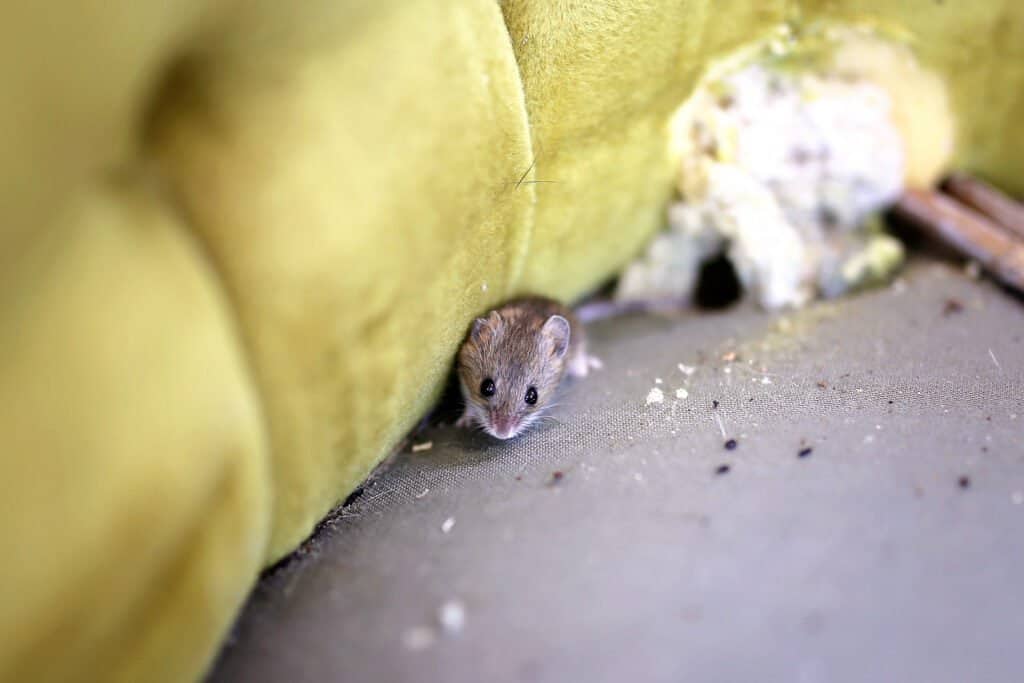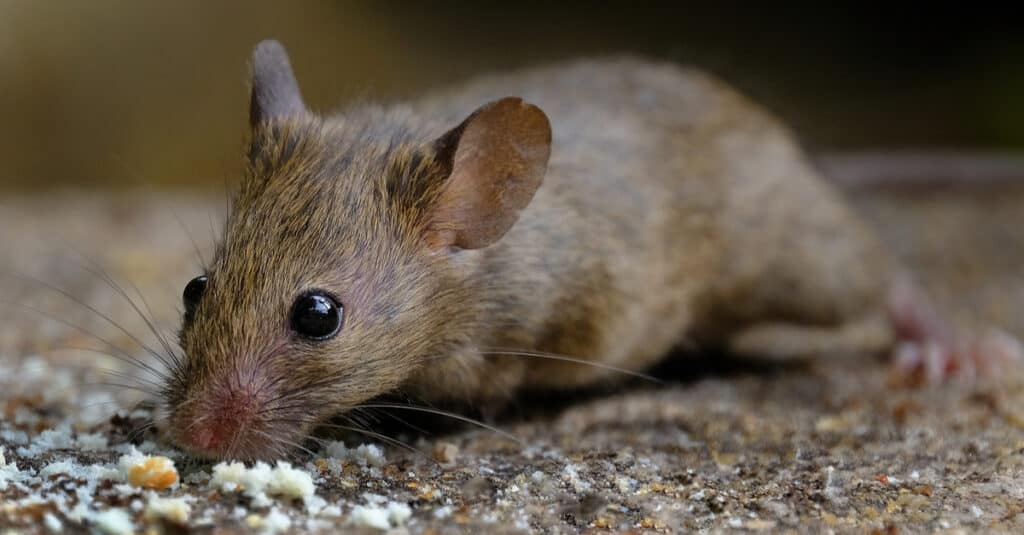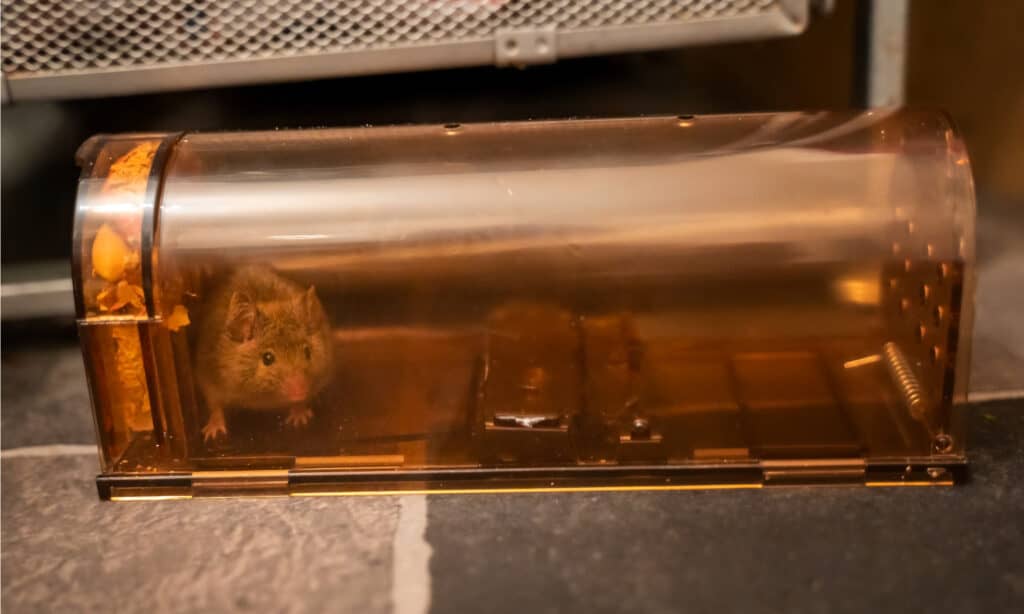Mice are the bane of kitchens, pantries, and garages around the world. Although it is easy to bait traps for them, not everyone wants to kill the mice, they just want them to go away. That’s why people continue to explore the different products that they can use to repel mice. One of the most common questions that people have is, does vinegar repel mice?
In this article, we’re going to explore why using smells to repel mice works, mention which smells work best and talk about whether you should have a bottle of vinegar handy to help you reduce an influx of mice into your home.
Where Will You Most Likely Find Mice?

You’ll find mice in places where there is food and shelter.
©ChristinLola/Shutterstock.com
Before you go dousing your home in vinegar or other products, it’s a good idea for you to learn where mice are most likely to hide. Since we’re looking at places where you can place vinegar, we will focus on areas around homes.
That being said, some of the places you’ll most likely find mice are:
- Garages
- Kitchens
- Basements
- Walls
- Ceilings
- Attics (yes, mice can climb)
- Cabinets
- Unused drawers
- Nesting along the outside of your home in tall grass
These are some of the most common hiding areas for mice. Mice can hide well in those areas, making it hard to locate them before they start having babies and leaving droppings and urine all over your home.
Why Smells Matter to Mice

Mice have a strong sense of smell, so using smells against them can help.
©Paulpixs/Shutterstock.com
Most people know the pungent scent of vinegar, but it probably wouldn’t stop you in your tracks. So, why would this work keep mice away from your home?
The theory is rather simple. Mice have a much stronger sense of smell than humans. In fact, they rely on their senses of smell, touch, and hearing more than their sense of sight to help them find food and safe places.
Now, imagine that they get a whiff of strong vinegar while they’re right on the ground. That smell would be much more powerful, and that’s why using smelly products to deter mice can work. We’ll show you some of the other most common household items that people use when they want to make sure mice stay away from their homes, too.
Does Vinegar Repel Mice?

White vinegar and apple cider vinegar are somewhat useful in repelling mice.
©focal point/Shutterstock.com
Vinegar has a limited ability to repel mice, but it can be used in conjunction with other approaches to limit the number of mice that enter your home. However, vinegar will not physically harm a mouse, so you can’t use it to kill them.
Another thing to consider is that many types of vinegar exist. You’ll want to opt for the most pungent of them if you’re trying to repel mice. In that case, you should pick up some white vinegar or even apple cider vinegar to use around your home.
Again, vinegar may keep mice from entering a certain part of your house, but you need to consider other approaches to quell an infestation or potential infestation in your home.
How to Use Vinegar to Repel Mice
Knowing that mice don’t like the smell of vinegar is one thing, but successfully using the item is another. You don’t want to simply spray this item all over your home. That would probably aggravate the eyes and noses of people that live in the area more than anything else.
Instead, people that use vinegar to ward off mice typically soak cotton balls in the substance and then place them in areas where they have seen mice droppings or heard mice. For example, you may put the cotton balls in the bottom of your pantry to make mice think twice about getting inside.
You may also put them in cabinets and around appliances that are no longer in use, such as a basement refrigerator.
Another approach you can use is to leave out a small cup with the vinegar in it to make a more intense smell to scare off mice.
Still, you have to keep in mind that the smell of white vinegar is not pleasant to most humans, either. You’ll want to use this product temporarily to flush out mice from their hiding spots while you seal up your home to prevent mice from getting inside.
Once you’re sure that you’ve closed off the way for the mice to get inside, it’s time to take more permanent measures to get rid of them.
Other Smells That Mice Hate

Mice hate the intense smell of peppermint oil.
©Madeleine Steinbach/Shutterstock.com
Some people can’t stand the smell of white vinegar or don’t have a bottle sitting around. Fortunately, mice hate a wide variety of powerful smells. That means you have options for repelling mice.
Take a look at some of the other smells that mice are known to hate:
- Peppermint oil
- Cayenne pepper
- Dryer sheets
- Cinnamon
- Ammonia
- Clove
Keep in mind that putting these items around your house can make it smell bad or could be outright dangerous in the case of ammonia. The better approach is to take more permanent and direct measures to get rid of the mice that are annoying you.
Permanent Measures to Get Rid of Mice

A mouse trap is the only way to permanently remove mice from a home.
©lortek/Shutterstock.com
The best way to get rid of mice is to trap them and either release them into a wooded area or dispose of their bodies. These are permanent measures that remove the threat of disease to you and your family and ensure your home doesn’t become filled with mouse nests.
Yet, if you already have mice inside your home, you need to answer one question: how did the mice get inside?
You need to scour your home and find points of entry, from holes in your foundation to gaps in your roof. Find out how the animals are getting inside and patch it up. Once that is finished, you can take care of the problem inside and not have to worry about sharing your food with pests.
So, does vinegar repel mice? Yes, but in a very limited way that you should not count on to get rid of an infestation. Instead, focus on shoring up your home’s defenses, laying mouse traps, and practicing good food storage methods that discourage mice from getting into your home.
The photo featured at the top of this post is © Landshark1/Shutterstock.com
Thank you for reading! Have some feedback for us? Contact the AZ Animals editorial team.






